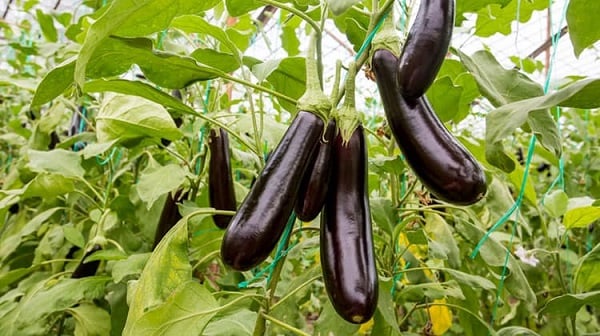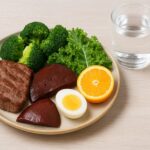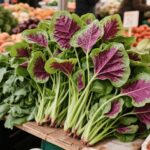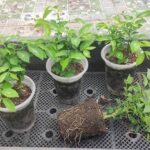Eggplant is a familiar vegetable in Vietnamese cuisine. It is a nutritious vegetable that can be cooked in a variety of ways. The main components of eggplant are water and fiber, which are great for digestion. According to calculations, 100 grams of fresh eggplant contains approximately 25 calories, low fat, and no cholesterol, making it suitable for dieting or weight loss.
Eggplant contains vitamins such as vitamin C, K, and B6, as well as minerals such as potassium, manganese, and folate. Notably, the eggplant’s skin contains the antioxidant anthocyanin, particularly nasunin, which protects cells from free radical damage, helping to prevent aging and support cardiovascular health.

Despite its benefits, eggplant may not be suitable for everyone:
Individuals with a weak digestive system or prone to stomach discomfort
Eggplant has a cooling property, according to Eastern medicine. Therefore, it may not be suitable for those with a sensitive digestive system, prone to stomach pain, bloating, or diarrhea. Consuming raw or undercooked eggplant can cause digestive issues in individuals with a “cold” body constitution, leading to stomach pain, discomfort, and bloating. It is advisable to limit eggplant intake when experiencing stomach issues.
People with arthritis or gout
Eggplant belongs to the Solanaceae family, which contains compounds such as purines and solanine. Purines can break down into uric acid in the body, a primary cause of gout. Solanine can also induce inflammation or pain in certain individuals, especially those with arthritis. Individuals with joint pain or gout should steer clear of this vegetable.
Individuals allergic to nightshade vegetables
Although rare, some people may be allergic to eggplant. Allergic reactions can include red spots, itchy mouth, swollen lips, rashes, stomach pain, or diarrhea. This is due to proteins in eggplant that resemble those in pollen or other allergens found in nightshade vegetables. If you have allergies to tomatoes, potatoes, or bell peppers, exercise caution when consuming eggplant and start with a small amount to test your tolerance.

Pregnant women, especially during the first trimester
Eggplant has a cooling property, and excessive consumption may disrupt digestion. Pregnant women are more sensitive and prone to digestive issues like diarrhea or constipation. Therefore, it is advisable to consume less eggplant during pregnancy. Additionally, excessive intake during the first trimester can cause uterine contractions, which can be dangerous.
Individuals with anemia or physical weakness
Eggplant contains phenolic compounds that can inhibit iron absorption, an essential mineral for blood formation. Individuals with iron-deficiency anemia or physical weakness should limit their intake of eggplant, especially when paired with iron-rich foods, as it may reduce nutrient absorption. Excessive eggplant consumption can lead to anemia, resulting in pale skin and fatigue.
Individuals taking blood-thinning medication
Eggplant is rich in vitamin K, which directly impacts blood clotting. For individuals taking blood-thinning medication such as warfarin, excessive eggplant intake may reduce the medication’s effectiveness and disrupt blood clotting balance. Such individuals should consult their doctors before including eggplant in their daily diet.
The Golden Key to Nurturing Healthy Blood: The Overlooked Simple Secret
“Blood is life” is a well-known saying, but not many understand the true essence of maintaining healthy blood flow and its nourishment to the body. The secret to a well-nourished circulatory system is surprisingly simple and can be easily implemented at home – it’s just a matter of knowing where to start.
The Ultimate Guide to Super-Fast-Growing Vegetables: Save Time and Money with this Miracle Crop
No need for a sprawling garden or fertile soil – this “miracle” vegetable grows like a weed and can be harvested all month long with just a single planting. With a nutritional value surpassing that of oranges, yet so easy to cultivate that even a novice gardener can succeed, this vegetable is truly a wonder.





































